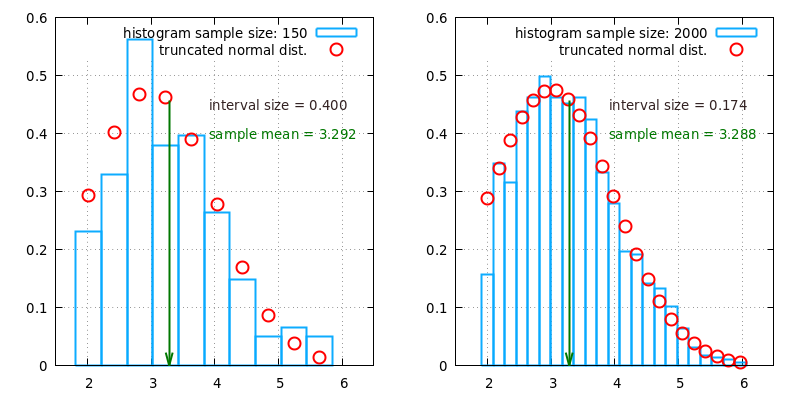https://github.com/simphotonics/sample_statistics
Sample statistics, histograms, probability distributions, and random sample generators for Dart.
https://github.com/simphotonics/sample_statistics
error-function probability-distribution random random-number-generators sample statistics
Last synced: 10 months ago
JSON representation
Sample statistics, histograms, probability distributions, and random sample generators for Dart.
- Host: GitHub
- URL: https://github.com/simphotonics/sample_statistics
- Owner: simphotonics
- License: bsd-3-clause
- Created: 2020-10-27T23:15:40.000Z (about 5 years ago)
- Default Branch: main
- Last Pushed: 2024-05-30T17:32:27.000Z (over 1 year ago)
- Last Synced: 2025-03-24T04:43:25.693Z (10 months ago)
- Topics: error-function, probability-distribution, random, random-number-generators, sample, statistics
- Language: Dart
- Homepage: https://pub.dev/packages/sample_statistics
- Size: 835 KB
- Stars: 3
- Watchers: 1
- Forks: 1
- Open Issues: 0
-
Metadata Files:
- Readme: README.md
- Changelog: CHANGELOG.md
- License: LICENSE
Awesome Lists containing this project
README
# Sample Statistics
[](https://github.com/simphotonics/sample_statistics/actions/workflows/dart.yml)
## Introduction
The package [`sample_statistics`][sample_statistics] provides helpers for
calculating *statistics* of numerical samples and generating/exporting
*histograms*. It includes common *probability
distribution* functions, an approximation of the *error function*,
and random sample *generators*.
Throughout the library the acronym *Pdf* stands for *Probability Distribution
Function*, while *Cdf* stands for *Cummulative Distribution Function*.
## Usage
To use this package include [`sample_statistics`][sample_statistics]
as a dependency in your `pubspec.yaml` file.
### 1. Sample Statistics
To access sample statistics use the class [`Stats`][Stats].
It calculates sample statistics in a lazy fashion and caches results
to avoid expensive calculations if the
same quantity is accessed repeatedly. If the random sample changes
use the method `updateCache()` to recalculate the sample statistics.
```Dart
import 'package:sample_statistics/sample_statistics.dart'
void main() {
final sample = [-10, 0, 1, 2, 3, 4, 5, 6, 20]
final stats = Stats(sample)
print('\nRunning statistic_example.dart ...')
print('Sample: $sample')
print('min: ${stats.min}')
print('max: ${stats.max}')
print('mean: ${stats.mean}')
print('median: ${stats.median}')
print('first quartile: ${stats.quartile1}')
print('third quartile: ${stats.quartile3}')
print('standard deviation: ${stats.stdDev}')
final outliers = sample.removeOutliers();
print('outliers: $outliers')
print('sample with outliers removed: $sample');
// Update statistics after sample has changed:
stats.updateCache();
}
```
Click to show console output.
```Console
$ dart sample_statistics_example.dart
Running sample_statistic_example.dart ...
Sample: [-10, 0, 1, 2, 3, 4, 5, 6, 20]
min: -10
max: 20
mean: 3.4444444444444446
median: 3
first quartile: 1
third quartile: 5
standard deviation: 7.779960011322538
outliers:[-10, 20]
sample with outliers removed: [0, 1, 2, 3, 4, 5, 6]
```
### 2. Random Sample Generators
The library `sample_generators` includes functions for generating random samples
that follow the probability distribution functions listed below:
* normal distribution,
* truncated normal distribution,
* exponential distribution,
* uniform distribution,
* triangular distribution.
Additionally, the library includes the function [`randomSample`][randomSample]
which is based on the [rejection sampling][rejection-sampling] method.
It expects a callback of type [`ProbabilityDensity`][ProbabilityDensity]
and can be used to generate random samples that follow
an *arbitrary* probability distribution function.
The program listed below demonstrates how to generated a random sample
and write a histogram to a file.
```Dart
import 'dart:io';
import 'package:sample_statistics/sample_statistics.dart';
void main(List args) async{
final xMmin = 1.0;
final xMmax = 9.0;
final meanOfParent = 5.0;
final stdDevOfParent = 2.0;
final sampleSize = 1000;
// Generating the random sample with 1000 entries.
final sample = truncatedNormalSample(
sampleSize,
xMmin,
xMmax,
meanOfParent,
stdDevOfParent,
);
final stats = Stats(sample);
print(stats.mean);
print(stats.stdDev);
print(stats.min);
// Exporting a histogram.
// Export histogram
await File('example/data/truncated_normal$sampleSize.hist').writeAsString(
sample.exportHistogram(
pdf: (x) =>
truncatedNormalPdf(x, xMin, xMax, meanOfParent, stdDevOfParent),
),
);
}
```
### 3. Generating Histograms
To generate a histogram, the first step consists in dividing the random
sample range into a suitable number of intervals.
The second step consists in counting how many sample entries fall into each
interval.
The figures below show the histograms obtained from two random samples that
follow a truncated normal distribution with
`xMin = 2.0`, `xMax = 6.0` and normal parent distribution
with `meanOfParent = 3.0`, and `stdDevOfParent = 1.0`.
The random samples were generated using the function
[`truncatedNormalSample`][truncatedNormalSample].
The histograms were generated using the extension method
[`exportHistogram`][exportHistogram], see source code above.

The figure on the left shows the histogram of a sample with size 150.
The figure on the right shows the histogram of a sample with size 600.
Increasing the random sample size leads to an increasingly
closer match between the shape of the histogram and
the underlying probability distribution.
Using the distribution parameters mentioned above with the function
[`meanTruncatedNormal`][meanTruncatedNormal], one can determine
a theoretical mean of 3.2828. It can be seen that in the limit of a
large sample size the *sample mean* approaches
the *mean* of the underlying probability distribution.
## Examples
For further examples on how to generate random samples, export histograms,
and access sample statistics see folder [example].
## Features and bugs
Please file feature requests and bugs at the [issue tracker].
[issue tracker]: https://github.com/simphotonics/sample_statistics/issues
[example]: https://github.com/simphotonics/sample_statistics/tree/main/example
[exportHistogram]:https://pub.dev/documentation/sample_statistics/latest/sample_statistics/StatisticsUtils/exportHistogram.html
[histogram]: https://pub.dev/documentation/sample_statistics/latest/sample_statistics/Stats/histogram.html
[meanTruncatedNormal]: https://pub.dev/documentation/sample_statistics/latest/sample_statistics/meanTruncatedNormal.html
[ProbabilityDensity]: https://pub.dev/documentation/sample_statistics/latest/sample_statistics/ProbabilityDensity.html
[normalPdf]: https://pub.dev/documentation/sample_statistics/latest/sample_statistics/normalPdf.html
[randomSample]: https://pub.dev/documentation/sample_statistics/latest/sample_statistics/randomSample.html
[rejection-sampling]: https://en.wikipedia.org/wiki/Rejection_sampling
[sample_statistics]: https://pub.dev/packages/sample_statistics
[samplePdf]: https://pub.dev/documentation/sample_statistics/latest/sample_statistics/samplePdf.html
[Stats]: https://pub.dev/documentation/sample_statistics/latest/sample_statistics/Stats-class.html
[truncatedNormalSample]: https://pub.dev/documentation/sample_statistics/latest/sample_statistics/truncatedNormalSample.html